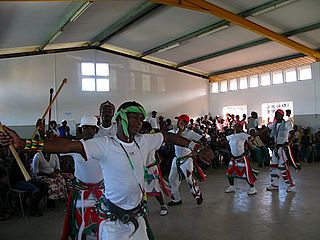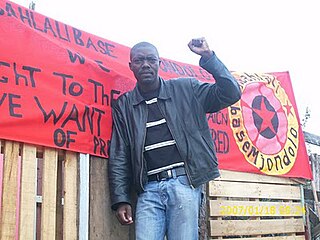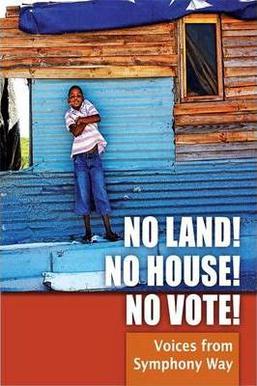Background
Before occupying the land Abahlali baseMjondolo organised an open and public 'cleaning campaign' on the land during which the land was cleared. [1] On the day of the occupation four people, including prominent academic Martin Legassick were arrested. [2] The arrests, which were accompanied by shooting with rubbfollowed two attempts by the occupiers to barricade the N2 in protest at the demolition of their shacks by the police. [3] The Cape Times quoted Clarissa Benjamin, a 47-year-old mother of three as saying "We have no place to stay. The government has millions to spend on building stadiums for 2010, but I have been waiting for a house for the past 20 years.". [4]
Bush Radio reported that [5] the local councillor had agreed, on 20 May, to hand the land over to the residents on 21 May and that the occupiers expected Cape Town Mayor Dan Plato to hand the land over in person. However the City of Cape Town sent in its Anti-Land Invasions Unit to demolish the shacks on 21 May. [6] According to Abahlali baseMjondolo the City demolished the shacks on the land each day since the land was occupied and the occupiers rebuilt their shacks each day. [7] [8] Because the City had no court orders for any of these demolitions they were, according to an article in the Cape Argus, "in strict legal terms, criminal". [9]

Abahlali baseMjondolo is a socialist shack dwellers' movement in South Africa which primarily campaigns for land, housing and dignity, to democratise society from below and against xenophobia.

Sibusiso Innocent Zikode is the president of the South African shack dwellers' movement, which he co-founded with others in 2005. Abahlali baseMjondolo claims to have an audited paid up membership of over 115 000 across South Africa. His politics have been described as 'anti-capitalist'. According to the Mail & Guardian "Under his stewardship, ABM has made steady gains for housing rights."

Kennedy Road is an informal settlement in Durban (eThekwini), in the province of KwaZulu-Natal in South Africa. Formed in the late 1970s or early 1980s, the settlement was mentioned by the African National Congress (ANC) after the end of apartheid but amenities were not improved. The site is mostly not connected to sanitation or electricity. Dissatisfaction with local councillors led to 2005 protests including a road blockade, out of which the shack dwellers movemment Abahlali baseMjondolo (AbM) formed. In 2009, an AbM meeting was attacked resulting in two deaths and a court case. More recently, the municipality has improved facilities and promised to relocate inhabitants.

The Western Cape Anti-Eviction Campaign was a non-racial popular movement made up of poor and oppressed communities in Cape Town, South Africa. It was formed in November 2000 with the aim of fighting evictions, water cut-offs and poor health services, obtaining free electricity, securing decent housing, and opposing police brutality.

The Poor People's Alliance was network of radical grassroots movements in South Africa. It was formed in 2008 after the Action Alliance, formed in December 2006, was expanded to include two more organisations. It become defunct following the collapse of two of its affiliated movements, the Western Cape Anti-Eviction Campaign and the Landless People's Movement.
The N2 Gateway Occupations saw large numbers of government-built houses occupied illegally by local residents of Delft in the Western Cape during December, 2007. The houses in question were the new Breaking New Ground (BNG) houses in the Symphony section of Delft near the main road Symphony Way. This was the largest occupation of houses in South Africa's history.
No Land! No House! No Vote! is the name of a campaign by a number of poor people's movements in South Africa that calls for the boycotting of the vote and a general rejection of party politics and vote banking. The name is meant to imply that if government does not deliver on issues important to affected communities these movements will not vote.
Martin Legassick (1940–2016) was a South African historian and Marxist activist. He died on 1 March 2016 after a battle with cancer. He was one of the central figures in the "revisionist" school of South African historiography that, drawing on Marxism, revolutionised the study of the social formation of Apartheid by highlighting the importance of political economy, class contradictions and imperialism. He was also a key figure in the independent left in South Africa from the 1970s, and a critic, from the left, of many of the analytical and strategic positions taken by the African National Congress and the South African Communist Party, as well as their understanding of South African history. The author of numerous books, mainly on the history of colonialism and capitalism, he collected many of his key political writings in his 2007 book Towards Socialist Democracy.

Mzonke Poni is an activist in Cape Town. He is the former chairperson of Abahlali baseMjondolo of the Western Cape and was previously a leader of the Western Cape Anti-Eviction Campaign. The Sunday Times has described him as "the face of an ANC nightmare - an angry activist mobilising the township masses to protest at what he calls the government's failure to create a better life for the poor."
South Africa has been dubbed "the protest capital of the world", with one of the highest rates of public protests in the world.

The KwaZulu-Natal Elimination and Prevention of Re-emergence of Slums Act, 2007 was a provincial law dealing with land tenure and evictions in the province of KwaZulu-Natal in South Africa.
QQ Section also known as Tambo Park, was founded in 1989 and is an Informal Settlement in the Site B sub-division of Khayelitsha in South Africa.

No Land! No House! No Vote! Voices from Symphony Way is an anthology published in 2011 of 45 factual tales written and edited by the Symphony Way Pavement Dwellers.
Michael Sutcliffe is the former municipal manager of the eThekwini Metropolitan Municipality, which includes the city of Durban, South Africa. During his time in the position he was widely reported to be a controversial figure amongst Durbanites and was the target of popular protest in the city.
The Constitution of South Africa protects all basic political freedoms. However, there have been many incidents of political repression, dating back to at least 2002, as well as threats of future repression in violation of this constitution leading some analysts, civil society organisations and popular movements to conclude that there is a new climate of political repression or a decline in political tolerance.
There have been many political assassinations in post-apartheid South Africa. In 2013 it was reported that there had been more than 450 political assassinations in the province of KwaZulu-Natal since the end of apartheid in 1994. In July 2013 the Daily Maverick reported that there had been "59 political murders in the last five years". In August 2016 it was reported that there had been at least twenty political assassinations in the run up to the local government elections on the 3rd of August that year, most of them in KwaZulu-Natal.
In March 2013 around a thousand people occupied a piece of land in Cato Crest, Durban and named it Marikana after the Marikana miners' strike. Mayor James Nxumalo blamed the occupation on migrants from the Eastern Cape. He was strongly criticised for this by the shack dwellers' movement Abahlali baseMjondolo who said that "The City Hall is red with blood".
On 27 April 2013, the national public holiday of Freedom Day in South Africa which some grassroots social movements have termed UnFreedom Day, members of Abahlali baseMjondolo occupied a piece of land in Philippi, Cape Town. They named the occupation Marikana after the Marikana miners' strike. The occupation was repeatedly destroyed by the city's anti-land invasion unit. According to the Daily Maverick the occupiers were evicted on six separate occasions. Two months after the eviction 90 people were still sleeping on the site under a tent.

The eKhenana Commune is a prominent land occupation in the historic working-class area of Cato Manor in Durban, South Africa. According to the Socio-Economic Rights Institute "The eKhenana settlement is organised as a cooperative in which residents collectively run a communal kitchen and tuck shop, theatre, poetry and music projects, and care for a vegetable garden named after the late Nkululeko Gwala [assassinated in 2013] as well as a poultry farm named in honour of the late S’fiso Ngcobo [assassinated in 2018]. The Commune has solar power and is also home to a political school that residents named the Frantz Fanon School, as well as the Thuli Ndlovu Community Hall [Ndlovu was assassinated in 2014]. The Commune has suffered sustained political repression, including multiple arrests and three assassinations in 2022.









